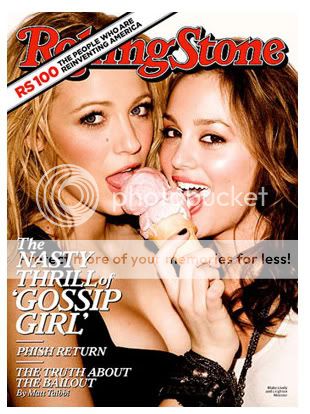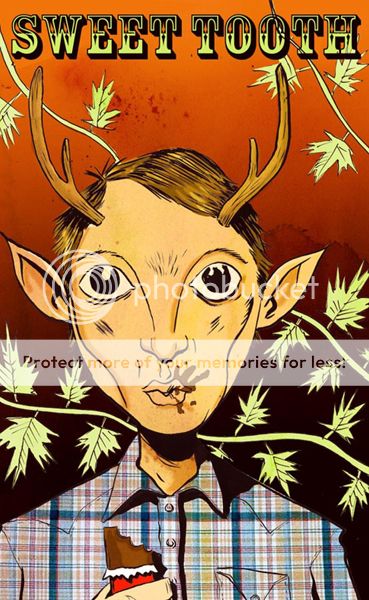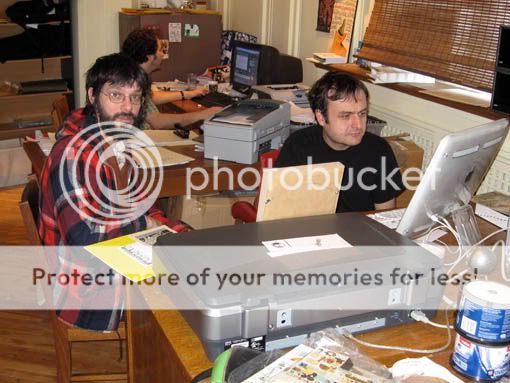* There isn’t much in this rather sycophantic Wired.com interview with Grant Morrison you haven’t heard the writer say before, but good gravy, take a look at the cover for the collected edition of Final Crisis by J.G. Jones.
* Actually, he does say one thing that strikes me as being some serious horror blogosphere-bait:
Wired.com: Like continuity, is crisis itself becoming obsolete? Disaster scenarios seem to just get heavier and more mind-blowing, but they also are becoming more ubiquitous. Are we too inured to apocalypse and crisis these days to be scared of it anymore?
Morrison: I don’t know if we’re so much inured to apocalypse as almost sexually obsessed by it. We could only love apocalypse more if it had 4 liters of silicone in each tit. Think of all those videogames where the Earth’s overrun by insect-aliens or there’s been an atomic war and we’re stumbling in the ruins with a gun we stole from a zombie. We should be grateful that we live in a culture so insulated from true horror it can afford to play with fear as entertainment.
That’s a rather egregious misreading of the role and provenance of horror art and entertainment, no?
* Meanwhile, the pullquote from Morrison’s interview at Comic Book Resources isn’t from Morrison himself, but from the “tune in next time” text at the bottom:
Check back with CBR News on Friday for a new interview with Grant Morrison, where he discusses “Seaguy: The Slaves of Mickey Eye,” and some other projects he’s currently writing for DC Comics including one book about the Multiverse and a second in the vein of “Watchmen” featuring the heroes of Earth-Four, who are all former Charlton Comics characters.
Emphasis mine. The war of No-Beard against All-Beard continues!
* Speaking of Alan Moore, read this conversation between Carl Wilson and Peli Grietzer about Gossip Girl. (Seriously, it has something to do with Alan Moore, I promise. The thesis they tease out is that much of the “trash culture” you see enthusiastically consumed by, oh I don’t know, ex-Ivy League pop-culture bloggers–from Gossip Girl to Britney Spears’ recent albums–is actually produced with precisely that audience in mind, often by creators who come from that demographic themselves. Given my ambivalent feelings toward “poptimism,” this quote from Grietzer stuck me:
i guess my general thought here is that so much of what’s taken to be literati\hipsters\whatever breaking beyond taste-barriers [some but not all of what ‘poptism’ delineates] is more about a certain generation taking over the production of popular culture and catering to its own tastes rather than a generation shifting its tastes towards ‘the people’.
…as did this from Wilson:
There’s research on the reasons for the “omnivorism” shift among elite consumers, some of which credit it to globalization and multiculturalism – that in the post-industrial economic order, it’s more important to demonstrate your code-switching skills, and not to seem married to a single set of cultural markers.
I resemble that remark! This is part of why I was so taken aback by Alan Moore’s dismissive comments about Hollywood filmmaking, superhero comics, and the like–the bulk of my cultural consumption and conversation takes place in a space where the more voracious a polyglot you are, and the lower your barriers to low culture, the better. (Via Matthew Perpetua.)
* And speaking of Gossip Girl, I have my problems with Terry Richardson, but this is not one of them.
* Tim O’Neil continues slouching toward a Kingdom Come review, this time by pinpointing the rise of Alex Ross as the moment where DC in particular began drinking the “heroes as icons” Kool-Aid. I think you continue to see that play out everywhere from Kurt Busiek’s approach to the Batman/Superman/Wonder Woman trifecta in Trinity to the company-wise fixation on “legacy heroes.”
* This new Vertigo series Sweet Tooth from Jeff Lemire seems interesting. It doesn’t like like An HBO Original Series at all.
* Hey, here’s what Marc Bell looks like these days: A psychotic drifter! And Chris Oliveros looks like Gary Groth’s cousin as always.
* What is wrong with people? Something is very wrong with people.
* Finally,






I’m just so happy to be mentioned in the same post as Grant Morrison.
“a rather egregious misreading of the role and provenance of horror art and entertainment”
Who made you the Prester John of all things horror?
Glibness, from Grant Morrison? It’s more likely than you think…
Peli, my pleasure.
Tom, I had to look that up and I still don’t get it.
Matt, your “centipedes? in my vagina?” reference wins this comment thread.
“We could only love apocalypse more if it had 4 liters of silicone in each tit.”
I don’t agree. I prefer my end days to have tits that are soft and oh-so-supple to the touch. I wouldn’t mind if the apocalypse had pierced nipples, though. That might be OK.
That’s a rather egregious misreading of the role and provenance of horror art and entertainment, no?
No, I think the ayahuasca-and-Action Comics-fueled mind of Morrison is on to something. The criticisms of people we admire tend to cut deepest.
But I mean, cavemen told each other scary stories around the fire, and they LOVED them some demons back in the Dark Ages. I don’t think enjoyment of horror art has anything to do with whether or not you’re personally, or societally/collectively, in danger.
I agree that a love of the horror genre is not DEPENDENT on feelings of anxiety or fear. I think I can enjoy a good horror movie or story regardless of whether or not I’m afraid I’m going to be stabbed on the way out to my car or whether or not my home is going to go into foreclosure. HOWEVER…the broader tastes in horror do often reflect the current societal fears. While there will always be standard horrors we all can relate to as they play on childhood and primitive concerns and fears, I think that we can certainly chart out the greater, more prevalent trends in horror (and even crime and science fiction) based on the state of the economy, world political events, and even basic societal obsessions or concerns. I’m thinking even beyond the Big Bug films of the 50’s – I’m thinking more along the lines of works like Stephen King’s early stories and the Exorcist, or even the “torture porn” of the last few years. There’s obviously a danger in reading something like that as a ‘trend’ or social/cultural obsession, however. The modest success of the Road Warrior and the multiple lesser knock-offs that it spawned may or may not be a reflection of a broader social concern for the future – it’s tempting to say that the sheer volume of works of that nature indicates a palatable social concern or fear, for example. Not sure how you’d go about PROVING that, though; it all boils down to theorizing.
Forgive the caps on that post, please. That’s really obnoxious on my part.
I think that’s all true to some extent or another, Sean, but I thought what Morrison was saying is that it’s only when you’re living comfy lives that you can emotionally “afford” to enjoy horror, and that rings false to me.
AH, see I totally misread that. Yeah, I’d disagree with him if that is what he’s saying. I think Morrison was speaking pretty off-the-cuff. Maybe he should probably pick up a copy of King’s Danse Macabre – still one of the best books on the subject I’ve ever read.